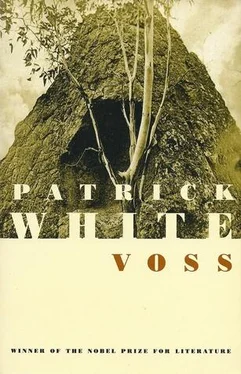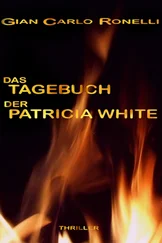Those to whom such mortification remained a mystery, groaned and shifted in their saddles. Those who were more enlightened, composed their mouths.
‘But the beds are all aired,’ ventured the bewildered Mrs Sanderson.
Voss’s jaws were straining under the hurt he had done to the others, and, more exquisitely, to himself.
It was doubtful whether even the admirable Sanderson could have led them out of the impasse to which they had come, when Palfreyman sighed deeply, and began to crumple forward, and to slide down, which shocked the company into doing something. Everyone was taking part. Everyone breathed relief, except Palfreyman himself.
‘Is he ill?’ asked Mrs Sanderson. ‘Poor man, it could be exhaustion.’
As they carried the unconscious Palfreyman towards the house, Voss related how his colleague had sustained a fall from a horse a short time ago, and although pronounced fit, it was not his personal opinion that Palfreyman was sufficiently recovered to take part in the expedition. Voss kept wiping his neck with a handkerchief, but seemed to find no relief. His explanations assumed the tone of threats.
When they reached the veranda of the house, which was a low-built, slab edifice, in colour a faded yellow ochre, with whitewashed posts and window-frames, a thick-set strong-looking individual appeared and took the body of the unconscious man, although nobody had asked him to do so.
To Mr Sanderson, it appeared perfectly natural.
‘This is Mr Palfreyman, the ornithologist. Who has fainted,’ he explained for the benefit of the stranger. ‘He has not long recovered from an illness. Take him to the corner room, if you will, so that my wife and I shall be near him, and able to give attention.’
Regaining consciousness soon after in a strange room, Palfreyman’s chief concern was to find someone to whom he might apologize. At his pillow was standing rather a thick-set man, to whom he was preparing to speak, when the individual went away.
The incident of the ornithologist’s collapse did at least cut the knot: in the confusion, explanations and comradeship that followed, Voss and Le Mesurier had also accepted quarters in the house, while Turner and Harry Robarts had been led off to the back by the grooms. Nobody referred to the strange objections raised by Voss. It was possible that he himself had forgotten, until such times as he would torment himself by reviving painful memories of all his past perversities.
Such night-growths withered quickly at the roots in that house, in which little children ran clattering and calling over the stone floors, maids came with loaves of yellow bread and stiffly laundered napkins, and dogs were whining and pointing at the smells of baking meats. In the big, low-ceilinged room in which the company was to eat, a fire of ironbark had been kindled. The clear, golden light flickered in patterns on the white cloth, until the advent of several mellow lamps. Finally, Mrs Sanderson herself, who had obeyed vanity to the extent of doing something different to her hair, brought her own contribution of light, and a branch of home-made candles to set upon the mantelpiece.
While they were waiting, their host had poured wine for Voss, Le Mesurier, and himself.
‘From our own grapes,’ he explained. ‘It is one of my aims to become self-supporting.’
And he went on to draw their attention to various bowls and jugs that he had modelled himself in local clay, and on which his wife had painted designs and then fired in their own kiln. If the clear colours and honest forms of their pottery had, in the one case, run, in the other, been distorted by the intense heat in which that had been tried, its poignance had increased.
That was the quality which predominated in the dining-room, in the whole homestead at Rhine Towers, a quality of poignance, for heights scaled painfully, or almost scaled. Incidental failure did not rob the Sandersons of success. It was perhaps the source of their perfection.
‘I do congratulate you for your remarkable achievement here in the wilderness,’ said Voss, whose wine was hot in his mouth. ‘And envy, too.’
Sanderson replied rather harshly.
‘It is for anyone to achieve who wishes to.’
Voss himself knew this.
‘But achievements differ in different men. It is not for me, unfortunately so, to build a solid house and live in it the kind of life that is lived in such houses. That is why’ — and he began guzzling his wine — ‘it is disturbing,’ he said. ‘Honest people can destroy most effectually such foundations as some of us have.’
He put down his glass.
‘I cannot express myself in English.’
Mrs Sanderson, who had sensed more than her husband would allow himself to, looked unhappy. She held her thin, though strong, hands to the fire, so that they looked transparent, and said:
‘It is time the others came.’
Le Mesurier, also seated at the hearth, and sensible of his leader’s mood even as their hostess was, bent down then and picked up a little girl in his arms.
‘What do you like best?’ he asked, with no trace of that cynicism with which he would protect himself from the omniscience of children.
The child answered, out of what had never really been a doubt:
‘Treacle tart.’
She was fingering the skin of his face, gravely, as he held her, and drowning him in her eyes. Of all the enchantments at work in that room, in which the fire was crackling and a dog hunting dream hares, this was perhaps the most powerful — until Angus broke the spell.
It was immediately apparent that this must be Angus who had burst in. He would be forgiven almost anything, even his wealth and his ignorance, by all but the most disgruntled, for handsome, clumsy, oblivious young men, together with thoroughbred horses and gun-dogs, cannot be held responsible. Because his face concealed nothing, withdrawn souls felt guilty for their secrets, and hastened to make amends by coming into the open. He was so amiable, reddish of hair, and ruddy of skin, with a smile that was particularly white.
‘You are late, of course, Ralph,’ Sanderson did not complain; ‘but I suppose punctuality is past praying for.’ For the benefit of Voss, he added: ‘This is a second Ralph. I am the first.’
The thought of being duplicated, even in name, seemed to give great pleasure to the host.
Voss accepted the handsome young man with some caution, remembering that Angus had been promised to his expedition. He did not, however, confess to this knowledge, just as Angus thought better than to mention the agreement that had been reached. Mentally they were stalking round each other as they stood making conversation with their hosts.
‘I think if we ring for Mr Judd,’ Mrs Sanderson finally decided.
The bell echoed through Voss. Remembering the convict to whom Mr Bonner had referred, the German realized it was this that he dreaded most of all.
Presently Palfreyman appeared, walking frailly, his lips composed, but a dark yellow in colour. At his side was the thick-set man who had taken possession of him on arrival.
‘Do you think this is wise?’ Sanderson asked.
‘Perfectly,’ smiled Palfreyman. ‘It was a passing weakness. That is all. I have rested these two hours on a good bed, and Mr Judd has very kindly fed me with rum out of a spoon.’
So the thick-set individual was Judd.
He was there now, not far from Palfreyman’s elbow. He seemed to have appointed himself nurse, which the patient accepted as a natural arrangement.
Judd was introduced to Voss, and the two men shook hands.
The former convict was in every way discreet, which was the more noticeable in anyone of his bulk and strength. He was, in fact, a union of strength and delicacy, like some gnarled trees that have been tortured and twisted by time and weather into exaggerated shapes, but of which the leaves still quiver at each change, and constantly shed shy, subtle scents. He was rather grizzled, deeply wrinkled on the back of his neck. It was difficult to estimate his age, but he was not old. He was quietly, even well spoken. What he knew could have been considerable, though would not escape from him, one suspected, even if pincers were brought to bear. Not that he mistrusted men. Rather had the injustice and contempt that he had experienced during a certain period sealed him up. Risen from the tomb of that dead life, he could not yet bring himself to recognize it as a miracle, and perhaps he would not, and perhaps it was not.
Читать дальше












